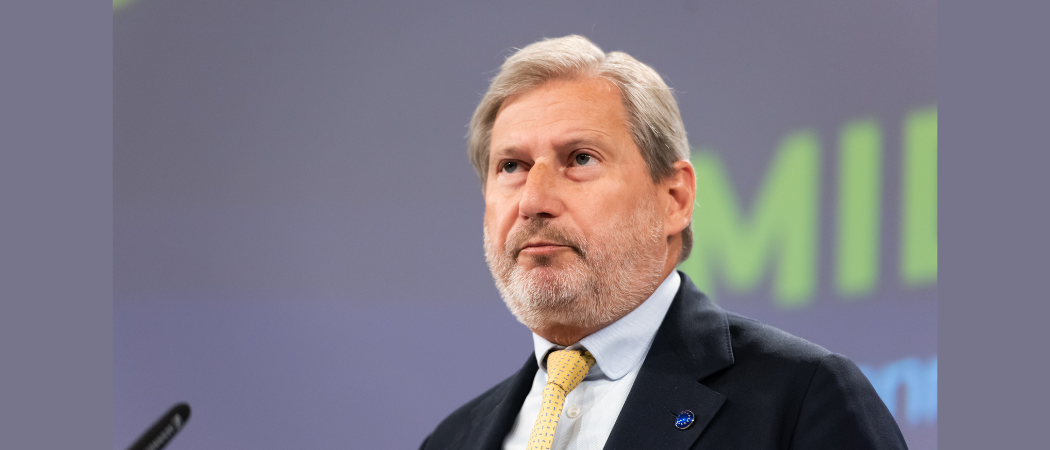A small top-up for Horizon Europe allays fears the budget would be cut, but there’s growing unease about the EU’s research programme becoming too focused on innovation

European budget commissioner Johannes Hahn. Photo: Aurore Martignoni / European Union
Research and innovation experts have welcomed a proposal to put an extra €2.6 billion into the European Innovation Council’s start-up fund, but are unsettled by the growing imbalance between fundamental research and close-to-market innovation in the Horizon Europe research programme.
The European Commission’s proposal is good news overall, according to Brussels research advocates. The top-up is small, with only €500 million of ‘new’ money, and the rest coming from moving money around from other budgets. But some had feared the €95.5 billion Horizon Europe programme could get filleted in the mid-term review of the EU budget, with money diverted to various policy priorities.
While the overall budget won’t decrease, €800 million would be taken from big collaborative research projects as part of the €2.6 billion top-up for the EIC’s Accelerator programme. The rest of the money would come from money allocated to research but not disbursed.
Mattias Björnmalm, secretary general of the university association CESAER, welcomes the top-up, geared at helping the EU catch up with competitors in the race for tech leadership, but says Horizon Europe as a whole helps the bloc build resilience and should have received a boost.
“It is unfortunate that the mid-term review proposal falls short of acknowledging the importance of the full value chain to boost resilience: ‘all of Horizon Europe’ in EU terms,” says Björnmalm. “It showcases that there is still work to do to create shared understanding about how key areas such as deep tech, clean tech and biotech are advanced, which is by leveraging all of Horizon Europe.”
Enora Bennetot Pruvot, deputy director for governance, funding and public policy development at the European University Association (EUA), shares this view. The EU should be investing in knowledge, “however, the outcome does not live up to these intentions,” she says. “We reiterate that investment in fundamental research needs to be upscaled at European level in a context of heightened global competition.”
And redistributing funding within Horizon Europe tilts the scales further towards innovation, notes Just van den Hoek, policy adviser at the Netherlands House for Education and Research. Money from the Horizon pillar for big collaborative projects has already been diverted to numerous policy-driven projects, such as the New European Bauhaus and the five Missions.
“This is problematic, because the balance in the programme has already not been solid,” says van den Hoek. “It’s fine to put these extra political ambitions on the EIC, but then provide more money that doesn’t come at the expense of other things in the programme.”
Ambitious but underwhelming
The top-up for the European Innovation Council (EIC) forms part of a proposed €10 billion package of investment in strategic technologies, the Strategic Technologies for Europe Platform (STEP).
The fresh pool of funding – to be distributed through InvestEU, the Innovation Fund, the European Defence Fund and the EIC Accelerator – is part of the EU’s response to the US $369 billion clean tech fund under the Inflation Reduction Act (IRA). It’s a welcome move, but against IRA, the scale of it is underwhelming, said van den Hoek. “If you look at the financial numbers, it doesn’t seem to be impressive, especially in light of the geopolitical considerations.”
He adds that there’s a lack of balance in the fund between implementation projects – funded through EU’s programmes such as InvestEU and the Innovation Fund – and technology development funded through the EIC Accelerator, which invests directly in start-up companies.
Xavier Aubry, member of the European Association of Innovation Consultants (EAIC), says the top-up for the EIC Accelerator is much needed. It was facing a lower budget for the next few years, as the extra funding it received from the EU’s recovery fund dries up and companies it has backed previously line up for follow-on equity funding.
“Despite all the challenges they went through, the companies are really counting on this instrument to raise funding,” said Aubry.
He hopes the money will help companies that have already had EIC funding get another boost. Deep tech start-ups are starting to apply again to grow further, but there’s not enough money for them.
The proposal will now pass through the Brussels policy mill. Member states are likely to try to curb its ambition. The European Parliament will likely fight for more money. Any new funding will be added only after the two institutions agree.





 A unique international forum for public research organisations and companies to connect their external engagement with strategic interests around their R&D system.
A unique international forum for public research organisations and companies to connect their external engagement with strategic interests around their R&D system.